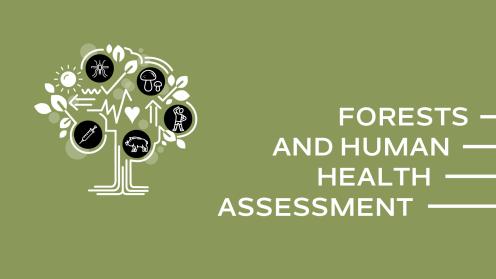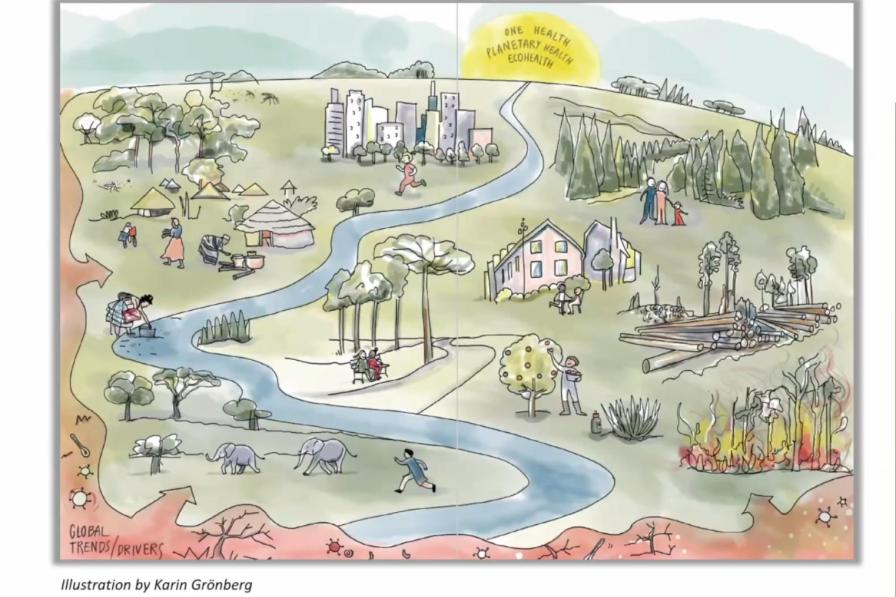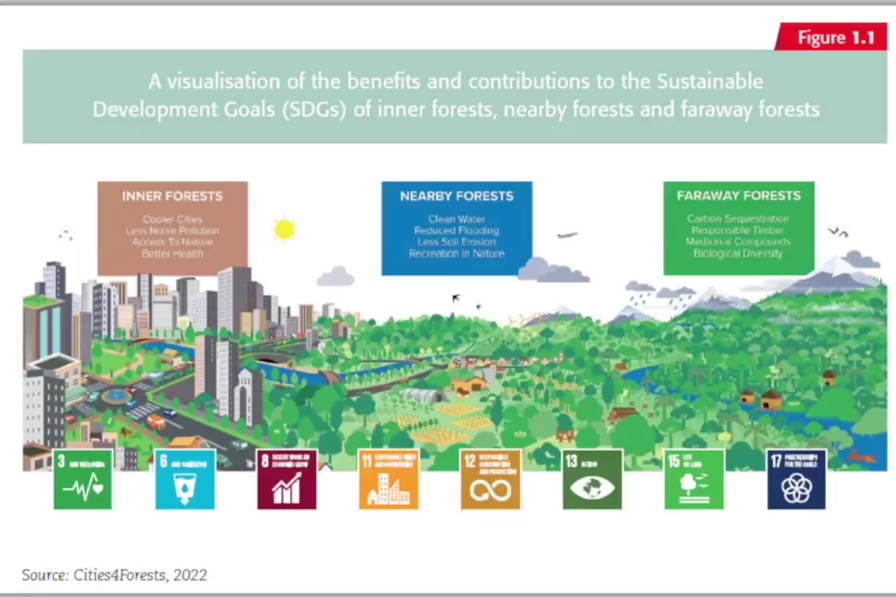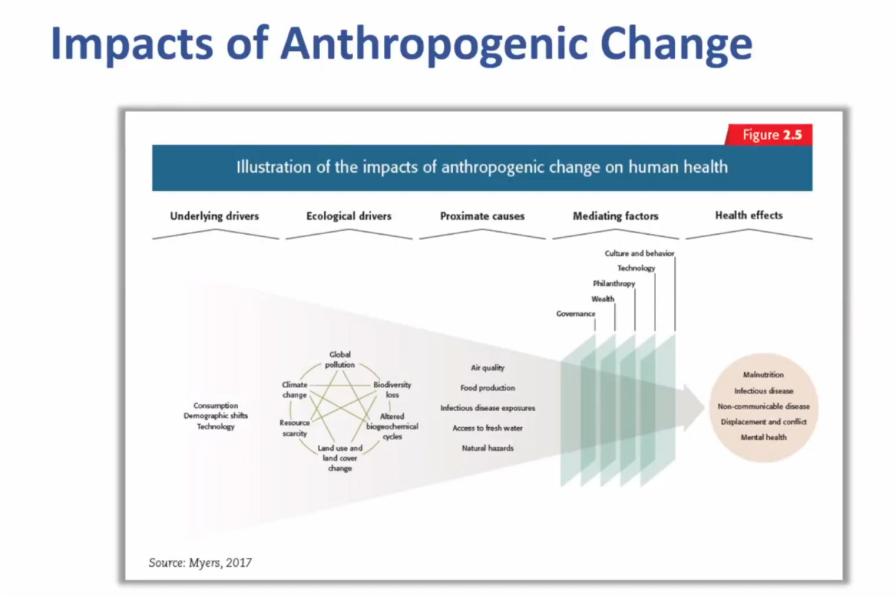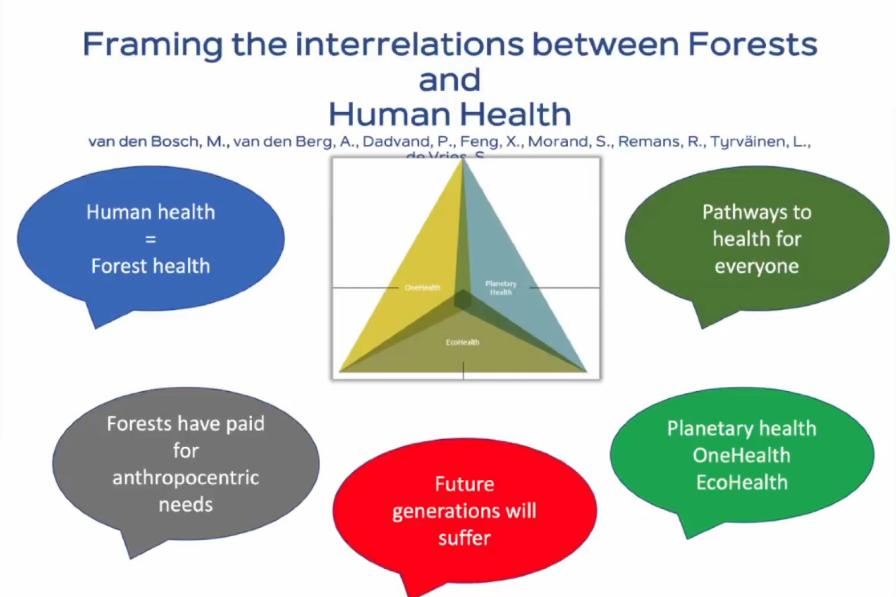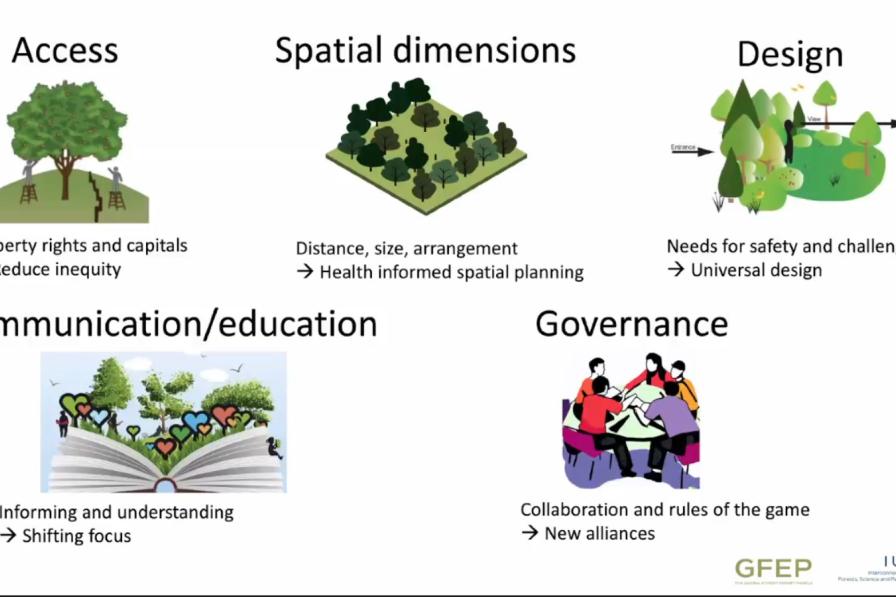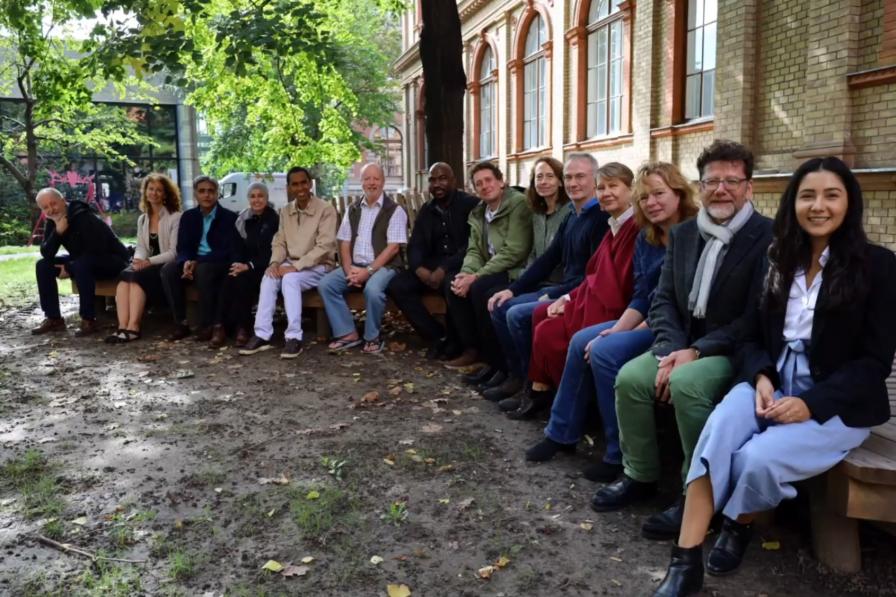Forests, trees, and green spaces play a vital role in ensuring a healthy life for all on a global scale. Furthermore, the health benefits of forests and trees, ranging from physical and mental well-being to overall mortality reduction, far outweigh the adverse effects on health. Recognizing the close links between human health, the health of other species, and the health of the planet as a whole is critical. These are some of the key messages of a new global assessment, titled Forests and Trees for Human Health: Pathways, Impacts, Challenges and Response Options, which was produced by the Global Forest Expert Panels (GFEP) Programme of the International Union of Forest Research Organizations (IUFRO).
Developed by an international and interdisciplinary team of scientists, this report was launched online on 21 March 2023, on the occasion of the International Day of Forests. Christoph Wildburger, IUFRO-GFEP Programme Coordinator, opened the event, noting that the report is the most comprehensive global assessment to date on the links between forests and human health. He pointed to the need for integrated approaches, which is reflected in the Kunming-Montreal Global Biodiversity Framework adopted by the 15th meeting of the Conference of the Parties to the Convention on Biological Diversity, and is evident in several Sustainable Development Goals (SDGs).
Cecil Konijnendijk, University of British Columbia and Chair of the Global Forest Expert Panel on Forests and Human Health, delivered a keynote address on forests and trees for human health. He said the panel has a broad and integrative scope, moving away from a strictly anthropocentric perspective, and uses different frameworks, including the One Health approach, and the planetary health and eco-health perspectives. He added that research was held in three main contexts: urban, rural, and forest-proximate or dependent.
For most health-related outcomes, he noted, associations are mainly beneficial and relate to mental health and wellbeing, as well as longevity. For others such as cancer research, he added, evidence is mixed and more research is needed. He further highlighted limitations, including: that most of the research has taken place in the global north and in urban contexts; and knowledge gaps and research priorities, including on the need to study different populations and contexts, strengthen the valuation, assessment, and sharing of health benefits and costs, and strengthen the science-policy interface.
Konijnendijk presented the report’s key messages, including:
- forests, trees, and green spaces impact human health across all life stages;
- positive health outcomes of forests, trees, and green spaces significantly outweigh negative ones;
- the health outcome of forests is the result of several pathways that are dependent on context and individual lifestyles;
- forest-health relations offer solutions to global crises; and
- integrative and cross-sectoral approaches need to be adopted to improve forest-health linkages.
In conclusion, he underscored the need to restore the disturbed forest-people relationship and to enable transformation towards integrative policies and initiatives for forest-health outcomes.
Matilda van den Bosch, Barcelona Institute for Global Health (ISGlobal), Coordinating Lead Author, presented the report’s framing of the interrelations between forests and human health, highlighting the human-forest interdependence and the linkages between human and planetary health. She stressed global inequities regarding health outcomes and interactions with forests. She also called for considering environmental protection as an inherent part of the solution to health, drawing particular attention to the voices of Indigenous Peoples and local communities and the needs of future generations.
Payam Dadvand, ISGlobal, Coordinating Lead Author, presented an overview of empirical evidence regarding the association between green spaces, including forests and trees, and health outcomes, across different life stages. He drew attention to a wide range of beneficial associations, including: neurodevelopment in children; mental health and wellbeing, spiritual well-being, and cardiometabolic health in adults; and mental health and wellbeing, cognitive ageing, and longevity in the elderly. He noted limitations, including that evidence is mainly based on studies on the health effects of green spaces, and that these studies have been primarily conducted in high-income countries. He concluded, however, that forests, trees, and green spaces have great potential for improving the health and well-being of humans across all life stages.
Agnes van den Berg, Twente University, Coordinating Lead Author, presented insights on different response options that can enhance positive impacts while minimizing negative ones. She underscored the need to explicitly address human health in the development of forest-related plans and policies, and identified the following five themes and corresponding response options:
- Access, addressing the need to improve access to forests’ health benefits and reduce inequity, including property rights;
- Spatial dimensions, addressing issues regarding proximity, accessibility, and the development of well-connected networks of forests and other green spaces;
- Design, focusing on making health a guiding principle in forest management;
- Communication and education, addressing the need to build understanding of why forests are beneficial for health and well-being, and recognizing Indigenous Peoples’ knowledge; and
- Governance, requiring a change in the forest conservation and land-use discourse, and new alliances between governments and other actors.
A brief discussion addressed, among other issues, linkages between increased canopy cover and reduced deaths from heat waves, impacts of technological development, and forest-dependent communities.
Zhimin Wu, Director, Forestry Division, Food and Agriculture Organization of the UN (FAO), and Chair, Collaborative Partnership on Forests (CPF), drew attention to the benefits provided by forests, and urged accelerated action to reverse forest loss and restore forest coverage, including through strong commitments and implementation on the ground. He added that links to human health are crucial but often overlooked.
Cristina Romanelli, Programme Officer, Biodiversity, Climate Change and Health, World Health Organization (WHO), lauded the report for catalyzing collective knowledge to prevent disease and create health-promoting environments through inclusive approaches. She provided an overview of the linkages between healthy ecosystems and disease regulation, stressing that human-induced land-use changes are the primary factor of disease outbreaks. She noted opportunities offered by the One Health approach, and called for policy coherence and collaboration between the health and natural resource sectors.
Christoph Wildburger closed the event confirming the need for cross-sectoral integrative policy approaches.
